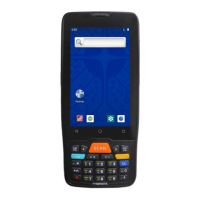76
MEMOR™ K
GLOSSARY
Access Point
A device that provides transparent access between Ethernet wired networks and IEEE
802.11 interoperable radio-equipped mobile units. Hand-held mobile computers, PDAs
or other devices equipped with radio cards, communicate with wired networks using
Access Points (AP). The mobile unit (mobile computer) may roam among the APs in the
same subnet while maintaining a continuous, seamless connection to the wired net-
work.
ASCII
American Standard Code for Information Interchange. A 7 bit-plus-parity code repre-
senting 128 letters, numerals, punctuation marks and c
ontrol characters. It is a standard
data transmission code in the U.S.
Barcode
A pattern of variable-width bars and spaces which represents numeric or alphanumeric
data in binary form. The general format of a barcode symbol consists of a leading mar-
gin, start character, data or message character,
check character (if any), stop character,
and trailing margin. Within this framework, each recognizable symbology uses its own
unique format.
Bluetooth@
A standard radio technology using a proprietary protocol. The onboard Bluetooth@
module in the device is compatible with the 2.1 protocol with Enhanced Data Rate
(EDR).
Boot
The process a computer goes through when it starts. During boot, the computer can run
self-diagnostic tests and configure hardware and software.
Character
A pattern of bars and spaces which either directly represents data or indicates a control
function, such as a number, letter, punctuation mark, or communications control con-
tained in a message.
Decode
To recognize a barcode symbology (e.g., Codabar, Code 128, Code 3 of 9, UPC/EAN, etc.)
and convert the content of the barcode scanned from a visual pattern into electronic
data.
Density (Barcode Density)
The number of characters represented per unit of measurement (e.g., characters per
inch).

